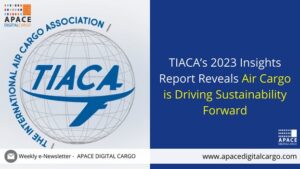
The third annual comprehensive report on the sustainable transformation of the air cargo industry has been released by The International Air Cargo Association (TIACA).
Since its launch in November 2019, TIACA’s Sustainability program has been tracking and assessing the sustainable transformation of the air cargo industry through its annual industry survey, which involves supply chain partners from across the globe representing various industry sectors and business sizes.
This year, there was a 28% increase in respondents, making the assessment more comprehensive. The responses have been analyzed and published, highlighting the industry’s progress compared to the first assessment conducted in 2020. The report’s findings continue to shape TIACA’s sustainability positions and strategy and address each of the eight key objectives outlined in TIACA’s Sustainability Roadmap.
“Sustainability is clearly on the minds of our industry colleagues and while “Sustainability” is a broad concept, through our work we are able to bring awareness to the industry that it is more than just the environment. Sustainability is doing good for the planet, people and business and at TIACA we like to do this through partnerships and innovation.” Glyn Hughes, TIACA Director General
Key highlights of the report:
- 64% of respondents state that the sustainability pressure has increased compared to last year, mainly driven by customers and regulators
- There is a clear link between ESG action and reputation report 85% of respondents
- 75% emphasize that sustainability is more important than last year
- 76% of companies have confirmed they have a sustainability strategy in place
- More companies have dedicated teams and budgets to drive sustainability
- 52% of companies produce a sustainability report
- 9% of companies have indicated a reduction in energy consumption in their operations
- 50% of companies have upgraded their fleets to cleaner aerial and ground vehicles
- Airlines, Ground handlers and Freight forwarders show largest investment in the use of SAF to decarbonize
- Overall SAF commitments make slow progress and are led by large companies
- Airlines lead the way with single-use plastics reduction up by 16% from 2022
- 58% of airports and 43% of freight forwarders have ramped up their efforts to combat wildlife trafficking
- 52% of companies primarily airlines and ground handlers make efforts to improve local air quality
- Freight forwarders take the lead in reducing their noise impact
- More emphasis needs to be placed on the role the industry plays in creating economic value
- Companies that place staff attraction and retention as number one objective are most likely to invest in innovation, 96%
- Digitalization is maturing across the board and has increased to 78% from 66%
- 79% of air cargo companies focus on improving efficiencies and operational excellence





